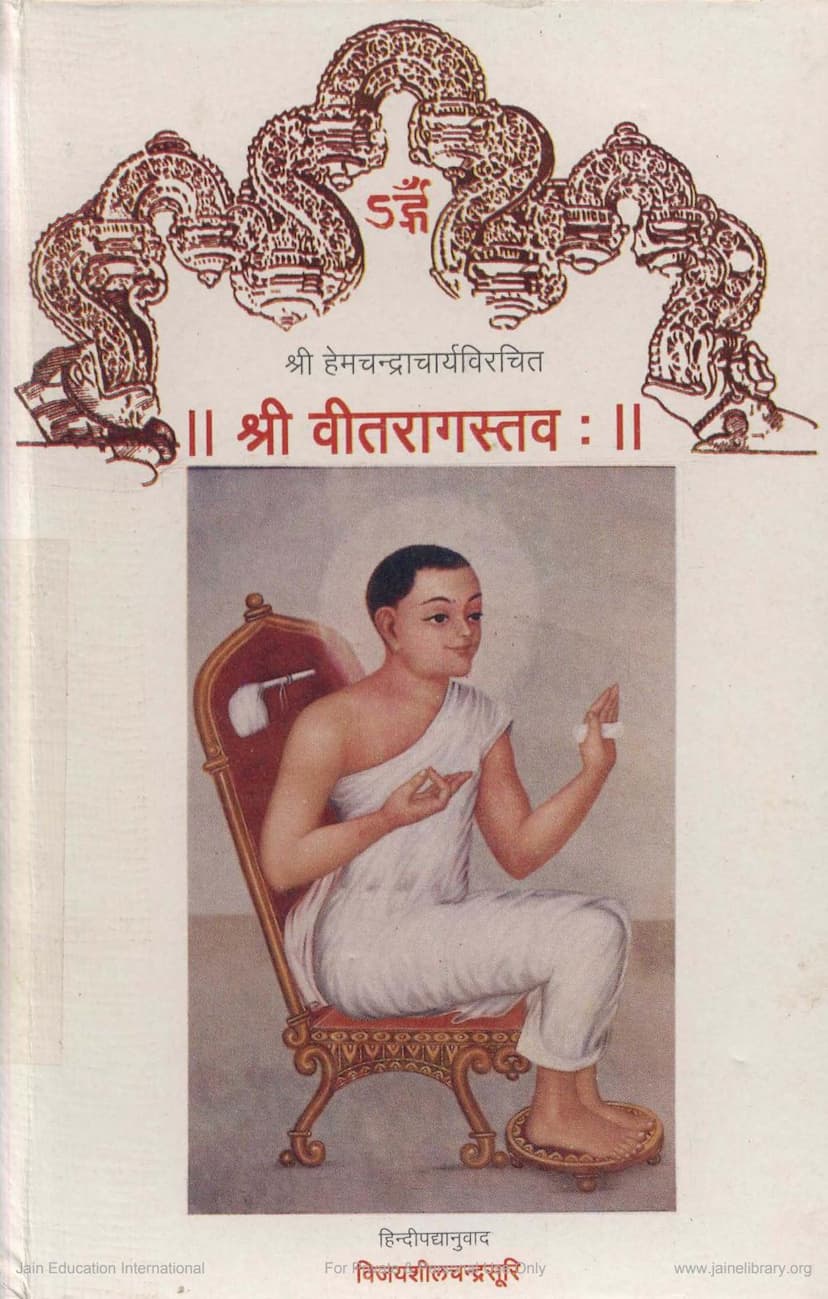Vitragstav
Added to library: September 2, 2025

Summary
Here's a comprehensive summary of the Jain text "Vitragstav" by Hemchandracharya, based on the provided text and catalog link:
Vitragstav (The Hymn to the Passionless)
Author: Acharya Hemchandracharya (also known as Kalikal Sarvagya - the Omniscient of the Kali Age) Translator: Vijayashilchandra Suri (Hindi poetic translation) Publisher: Kalikal Sarvagya Shri Hemchandracharya Navam Janmashatabdi Smruti Sanskar Shikshannidhi, Ahmedabad, 1996.
Overview:
"Vitragstav" is a highly revered and popular devotional work composed by the celebrated Jain Acharya Hemchandracharya. This Sanskrit stotra (hymn) is dedicated to the Jinas (victors over passions), who are the embodiments of detachment and spiritual liberation in Jainism. The text is praised for its profound philosophical insights, poetic beauty, and devotional depth.
Content and Structure:
The "Vitragstav" is structured into twenty chapters (Prakash), each focusing on a specific aspect of the Jina's virtues, qualities, and the path to liberation. The catalog link and the text itself indicate the following chapters, which can be summarized as follows:
- Prastavanastav (Introduction/Prelude): Sets the stage for the hymn, introducing the Jina as the supreme being and the source of all knowledge and liberation.
- Sahajatisayastav (Innate Miracles): Describes the inherent, natural miraculous powers and attributes of the Jina, arising from their perfected spiritual state.
- Karmakshayajatisayastav (Miracles from the Destruction of Karma): Highlights the extraordinary powers that manifest as a result of the complete eradication of karmic bondage.
- Surakrutatisayastav (Miracles Performed by Deities): Details the miracles performed by celestial beings in honor of the Jina, showcasing their supreme status.
- Pratiharyastav (The Eight Auspicious Symbols): Focuses on the Pratiharyas, the eight auspicious symbols that miraculously appear during the birth and enlightenment of a Tirthankara.
- Pratipakshanirastav (Refutation of Opposing Views): Addresses and refutes various philosophical and religious doctrines that contradict the Jain path, emphasizing the Jina's unique teachings.
- Jagatkartvanirastav (Refutation of the Creator God Concept): Critically examines and refutes the idea of a creator God, asserting the self-caused nature of the universe and the Jina's role as a guide, not a creator.
- Ekantanirastav (Refutation of Absolute or Exclusive Doctrines): Argues against extreme or one-sided philosophical views, advocating for the Jain principle of Anekantavada (many-sidedness).
- Kalistav (Praise of the Present Age): This chapter appears to be a unique and potentially ironic praise of the Kali Yuga (current age), possibly highlighting how devotion and the Jina's teachings are especially accessible and fruitful in this challenging era.
- Adbhutstav (Praise of the Wondrous): Celebrates the Jina's astounding and awe-inspiring qualities and actions that defy ordinary understanding.
- Mahimastav (Praise of Greatness/Glory): Extols the unparalleled glory, majesty, and supreme status of the Jina.
- Vairagyastav (Praise of Detachment): Focuses on the Jina's profound detachment from worldly pleasures and aversions, which is the very essence of their spiritual attainment.
- Hetunirastav (Refutation of Causality/Logic): Likely delves into refuting certain logical arguments or theories, perhaps related to the nature of existence or liberation.
- Yogashuddhistav (Purity of Yoga): Explores the principles of true Jain Yoga, emphasizing its purity and effectiveness in achieving spiritual liberation.
- Bhaktiyastav (Praise of Devotion): Centers on the importance of devotion, surrender, and love towards the Jina as a path to spiritual progress.
- Atmagrahastav (Self-Reproach/Self-Criticism): This chapter involves self-reflection and a humbling admission of one's own spiritual shortcomings in contrast to the Jina's perfection.
- Sharanagamanastav (Seeking Refuge): Expresses the earnest desire to seek refuge and solace at the feet of the Jina.
- Kathoroktiyastav (Praise through Contrasts/Strong Words): Utilizes contrasting language and strong statements to highlight the Jina's unique qualities by contrasting them with the limitations of other deities or worldly phenomena.
- Agnyastav (Praise of the Command/Guidance): Emphasizes the supreme importance of following the Jina's commands and guidance for spiritual advancement.
- Ashihstav (Benediction/Blessings): Concludes with prayers and blessings for the spiritual welfare and liberation of the devotees.
Key Themes and Significance:
- Vitragata (Passionlessness): The central theme is the Jina's state of being free from attachment, aversion, and all forms of passion. This is presented not as mere emptiness but as a state of perfect equanimity, purity, and omniscience.
- Anekantavada (Many-Sidedness): The text likely upholds the Jain principle of Anekantavada by refuting exclusive doctrines and presenting a comprehensive view of reality and the path to liberation.
- Devotion and Refuge: The "Vitragstav" is a powerful expression of devotion and the seeking of refuge in the Jina, seen as the ultimate spiritual guide and savior.
- Poetic Excellence: Hemchandracharya's mastery of Sanskrit is evident in the lyrical quality, rich imagery, and profound philosophical expressions within the stotra.
- Influence of Indian Traditions: The text acknowledges the influence of earlier devotional poetry, particularly mentioning the similarities and stylistic parallels with the "Adhyardha Shatak" of the Buddhist poet Matrcheta, highlighting a rich tradition of inter-religious and inter-textual dialogue in ancient India.
- Spiritual Discipline: The text emphasizes the importance of detachment, self-control, and right conduct as integral to spiritual progress.
- Royal Patronage: The mention of King Kumarpal suggests the text was composed or patronized during a period of significant Jain influence in royal courts.
- Modern Relevance: The publication of this Hindi poetic translation by Vijayashilchandra Suri demonstrates the enduring appeal and continued efforts to make these ancient Jain scriptures accessible to a wider audience.
In essence, "Vitragstav" is a masterful Jain hymn that extols the perfect spiritual state of the Jinas, their unique teachings, and the path of liberation through detachment, devotion, and right knowledge. It serves as a guide for spiritual aspirants, offering profound insights into Jain philosophy and inspiring a deep sense of reverence and aspiration.